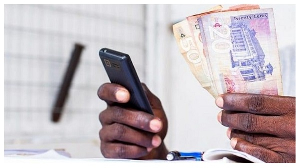Correspondence from Frank Aboagye, Bono Region:
Anaaba Agbango, a 51-year-old visually impaired farmer in Goka in the Bono Region, has depended significantly on mobile money transactions for years now.
He is able to send and receive money from family members and transact other businesses with this digital financial system from the comfort of his home.
“Mobile money has completely transformed my life. It enables me to maintain strong financial connections with my family, allowing me to send and receive funds effortlessly without facing the physical challenges that used to hinder me.”
Similarly, Faustina Agyiri, another visually impaired person in Berekum, has the same story to tell of how MoMo services have been of great help when it comes to digital financial transactions.
"Mobile money has made my life so much easier. I can send, receive, and save money, and even handle other financial tasks, all from the comfort of my home without going to a bank. It gives me the accessibility I need to manage my finances effectively and actively participate in the digital economy."
The need for inclusivity
Despite the impact of MoMo on Faustina and Anaaba, they are still excluded from harnessing the full benefits and opportunities of digital financial activities.
Faustina Agyiri raised issues of being unable to access mobile money without external support and cited instances when third-party individuals with access to her MoMo PIN under the guise of helping her transact MoMo services later withdrew money from her account without her consent.
“The MoMo service is reliable, but I cannot check my balance or send money without someone’s help, which sometimes leads to people stealing money from my account without my consent because they have access to my PIN. It’s disheartening because it feels like the system wasn’t made for people like me.”
Mahamadu Sirina, the National Vice President of the Ghana Federation of Disability Organisations, bemoaned that visually impaired persons face unique difficulties when using MoMo platforms, which are often not designed with accessibility in mind because the reliance on screen-based interfaces without audio guidance means many users are unable to navigate these systems independently, compelling them to depend on third-party assistance, which compromises their privacy and security.
“In using MoMo, our members who are visually impaired cannot check their balance or send money without someone’s help because that is how the system has been designed and this fuels the level of marginalisation against such individuals on digital platforms.”
Mahamadu Sirina added that making MoMo services accessible to visually impaired individuals is not just a step toward inclusivity but a leap toward a more equitable and innovative digital future for the country.
“Ensuring that MoMo services are accessible to visually impaired individuals is not merely a gesture toward inclusivity, it represents a transformative step toward fostering a society where everyone, regardless of ability, has equal opportunities to thrive in the digital economy.”
She stressed that such accessibility will also be in line with the Web Content Accessibility Guidelines (WCAG) 2.0 which defines how to make web content more accessible to people with a wide range of disabilities, including visual, auditory, physical, speech, cognitive, language, learning, and neurological disabilities.
With statistics from the 2021 Population and Housing Census indicating that 1.2 million people suffer from varying degrees of visual impairment, Dr Ken Ashigbey, the Chief Executive Officer (CEO) of the Chamber of Telecommunications, intimated that by enhancing the MoMo platform to be more inclusive and interactive, service providers will be tapping into an underserved market, ensuring that no one is left behind in the journey toward financial inclusion.
“That is an underserved market, so by investing in accessibility, service providers will not only fulfil a social responsibility but also tap into an underserved area, ensuring that no one is left behind in the journey toward financial inclusion.”
The way forward
For Ghana to fully actualise digital inclusion, Dr. Ken Ashigbey admitted that a lot has to be done to enhance the MoMo platform to be more inclusive and interactive not just for the visually impaired but for the aged, illiterate, and all marginalised to foster equity and promote a digital financial system that serves every segment of the population.
“The inclusivity should be broader than just focusing on only the visually impaired because we also have the aged and the illiterate, but most of the technologies are English and text-based so we need to ensure that the language that is used is the language of the people.”
He emphasised that a platform designed with accessibility features would allow individuals to conduct financial transactions in privacy, a critical aspect of maintaining their dignity and independence.
“What we have to do now is to find a way of moving our people from the USSD platform to the digital platform so that you are not dialling a code but it is a fact that you are able to see a picture somewhere, you are able to put your hand somewhere for your biometrics to be taken and you are able to speak to the device and it speaks back to you so that the people can do these transactions in their privacy.”
For Mahamudu Sirina, the telcos should explore accessible features such as integrating voice commands or voice navigation, screen reader compatibility, simplified menu structures, braille-compatible devices, customizable accessibility settings and secure audio confirmation for visually impaired users which will improve accessibility to mobile money (MoMo) services and create a more inclusive financial ecosystem that benefits all.
This report is produced by Frank Addo Aboagye under the DPI Africa Journalism Fellowship Programme of the Media Foundation for West Africa and Co-Develop.
Click to view details



General News of Tuesday, 24 December 2024
Source: www.ghanaweb.com

















